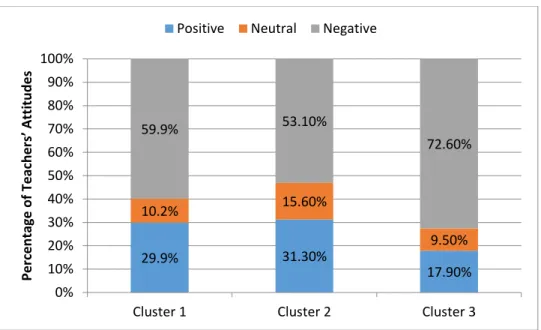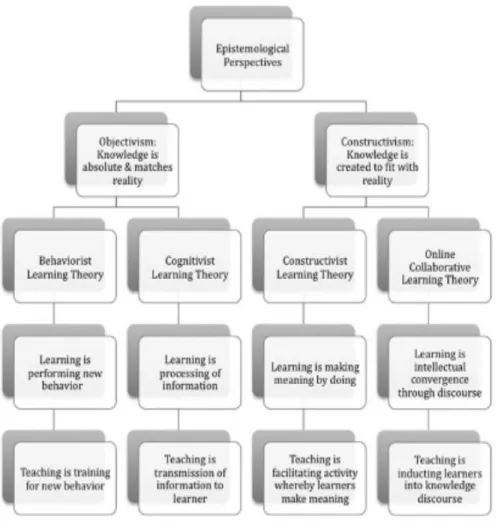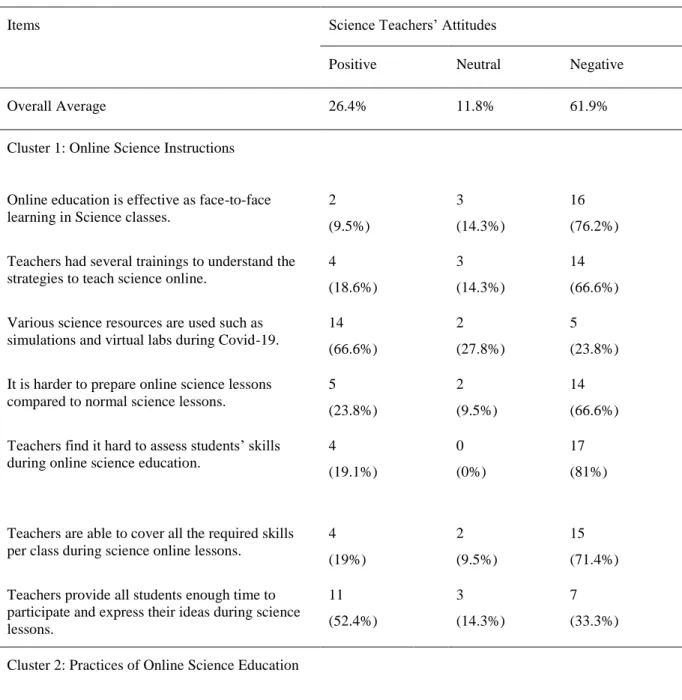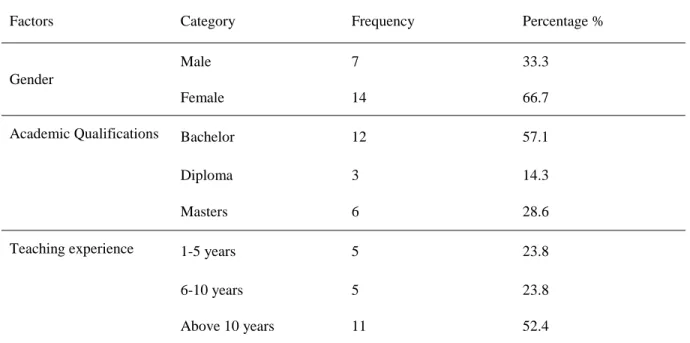In order to gain a deeper understanding of online science education, this study specifically focuses on the perceptions of teachers and leaders of online science education in the time of Covid-19. This research followed a mixed-methods approach in which a questionnaire was used to collect data from 21 secondary school teachers teaching science in American schools in the UAE to determine their perceptions of online science education (quantitative). In the second tool, 3 science leaders and 4 science teachers were interviewed to explore their perceptions of the use of online science education (qualitative).
Based on the results of this research, it can be inferred that the effectiveness of science education during the Covid-19 pandemic was not as high as traditional personal education. Improvements are needed in terms of curriculum, teaching strategies, and resources for online science education. Future research should be expanded to include a larger number of schools, educators, and curricula to gain a more comprehensive understanding of online science education.
INTRODUCTION
- Background
- Statement of the Problem
- Research Purpose and Questions
- Significance of the Study
A study conducted by Niemi & Kousa (2020) in Finland that studied students and teachers. Perceptions of online education at a Finnish secondary school during the COVID-19 pandemic showed that online education was successfully implemented, but faced many challenges. Teachers, on the other hand, expressed a negative attitude towards the interactions between students and teachers and the quality of online education. This research aims to evaluate the effect of online education on high school science teaching in US curriculum schools in the UAE by examining feedback from both teachers and leaders.
The purpose of this study is to examine the perspectives and actions of teachers and leaders regarding science online education in American high schools in the UAE. Online education is increasingly becoming a new norm in the education system, especially after the Covid-19 pandemic that forced the necessity of this norm. Additionally, this research highlights the strategies and practices implemented in teaching science during online education and sheds light on the barriers to online science education.
Theoretical Framework and Literature Review
Theoretical Framework
- Behaviorism
- Cognitivism
- Constructivism
- Connectivism
- Community of Learning
- Online Collaborative Learning
According to Felix Moedritscher, "Cognitive psychology involves the learning process from an information processing point of view, where information is received in the sensory storage through different senses and, further, transferred to the short-term and the long-term memory through different cognitive processes" (Moedritscher 2006). Ethan Remmel is the main contributors to the constructivist theory Jean Piaget and Lev Vygotsky Connectivism views the information affected as rapidly changing databases that require the continuous acquisition of that information with the necessity of the ability to distinguish between important and irrelevant information.
The developers of this model considered the cognitive presence to be equally important for online education. The authors defined the second core element of their model, social presence, as the ability of students to be present, not physically, but socially and emotionally to their individual characteristics. They considered this element as the support and facilitator of the first element and the key to success in developing critical thinking.
Literature Review
- The History of Science Education
- Science Education in High School
- Online Education in High School
In a publication by Future Labs about 20th century science education, Jonathon Osborne and Sara Hennessy stated that: “Science education in the UK is about to undergo a second fundamental change in its nature. The primary goal of science education should not be to produce future scientists, but to provide students with an education in and about science. A study conducted in the US to evaluate the American science education system, which involved 6,200 high school teachers, showed success in adapting classrooms for laboratory-based learning in biotechnology.
While the study includes feedback from a large number of high school teachers, the authors limited their study to biotechnology and went on to reveal conclusions about science education as a whole. Furthermore, the study seems to suggest that the solution to any issues in science education is simply to provide more in-service training for teachers, without considering other potential factors that may contribute to poor performance or the need for improvement. Another study in Italy sought to determine whether the use of inquiry-based science education in secondary school classrooms leads to better learning outcomes compared to traditional science education.
The study concluded that “on average, outcome in terms of outcomes was significantly improved by 4% with inquiry-based science education relative to a conventional science education approach, indicating differences between school specialties” (Muciaccia et al 2020). The study used a two-stage quasi-experimental crossover design in which the same teacher taught two biochemistry classes using inquiry-based science education and conventional science education. Although this study has some limitations, it provides insight into the impact of research-based science education in the Italian school system and suggests that this approach is desirable for students.
However, these promising findings may help educators identify strategies based on inquiry-based science education to better support students' reasoning and improve their skills. Andreas Krapp & Manfred Prenzel conducted a research paper which was focused on reviewing the measurement methods for high school students' interest in science. This research paper provides a solid review of the results and outcomes of the measurement methods for assessing high school students' interest in science education.
However, the research fails to translate the detailed review of measurement methods into detailed guidelines that readers should follow to improve student interest in science education.
Methodology
Research Approach
Research Methods
Ethical Consideration
Data Analysis and Results
- Descriptive Analysis
- Teachers’ Attitudes Towards Online Science Intructions
- Teachers’ Attitudes Towards Practices on Online Science Education
- Teachers’ Perceptions Towards Their Own and Their Students’ Attitudes
- Demographic Differences
- Qualitative Analysis of Teachers’ Interview Questions
- Qualitative Analysis of Leaders’ Interview Questions
From the results presented in both Table 1 and Figure 2, it is clear that the overall attitude of participating science teachers towards online science teaching is a negative one. This high percentage showed that the majority of the science teachers who were interviewed experienced a big difference between teaching science in the classroom and online which makes them see that face-to-face learning is more effective than online science teaching. This result revealed a negative attitude of science teachers towards their readiness to teach science online.
This high percentage showed the difficulties that science teachers faced in the transition to online education. The majority of science teachers (71.4%) did not agree that they could cover all required skills per class during online physics lessons. This high percentage also showed that science teachers could not maintain the same level and pace of education in online education compared to face-to-face education.
This result also showed that the majority of science teachers perceived or experienced difficulties or obstacles in developing students' key science skills through online science classes. In concrete terms, 47.6% of science teachers disagreed that students have the necessary ICT skills, while 28.6% agreed. Most science teachers (76.2%) disagreed that students were always attentive during distance learning.
This alarmingly high result highlights the well-being status of science teachers during online teaching which will directly affect the quality of education. Science teachers believe schools should provide resources to make teachers' roles easier, especially in online education. Furthermore, science teachers see professional development as essential for them to be trained in new online strategies and resources that will improve online science teaching.
In this question, science leaders shared their perceptions of the challenges their science teachers faced during online education. From the feedback of the interviewed science leaders, it is clear that there is a consensus between the leaders and their science teachers about the challenges that teachers face during online science education. While the third science leader interviewed considered “teacher training on the different platforms used and new teaching strategies that can be used in online science education” as the support he provided to science teachers.

Conclusion and Recommendations
- Discussion
- Conclusion
- Recommendations
- Limitations
The science teachers interviewed revealed that they lacked professional development and that they believed it was vital for them to be trained in new online strategies and resources that would improve online science education. On the other hand, the leaders had wrong perceptions about the practice of online science education. This statement is consistent with the perceptions of science teachers, who saw professional development as the main key to a successful and fruitful practice of online science education.
The third research question sought to investigate whether the demographic variables influence teachers' perceptions of online science education. It shows the weight of teaching experience on the perceptions of science teachers and how that experience contributed to the decision making and transition from face-to-face learning to online science teaching. These data show how higher academic training among science educators helped to have decisive perceptions about the difficulty of online science teaching compared to face-to-face teaching;.
For this study, we can draw conclusions from teachers' and leaders' perceptions of the effectiveness of online science education. From the collected data, it was clear that there is a big difference between online science education and face-to-face education. The surveyed teachers and participants in the questionnaire believe that online science education is not as effective as face-to-face science teaching in terms of engaging students, covering all required skills and standards, and assessing student achievement and progress.
The major consensus between science teachers and science leaders' perceptions was that teachers lacked the prerequisite readiness and tools to effectively implement online science education and to be able to assess the success of such a system without affecting the quality of students' science education. In this study, we focused on online science education and its effectiveness during covid-19 pandemic. From the feedback from science teachers and science leaders, we can conclude that science teaching during Covid-19 was not as effective as face-to-face science teaching with room for improvement in terms of curriculum, strategies and resources.
Interviewed science leaders highlighted the challenges faced by science teachers that hindered the process of teaching science online: The first challenge was the technical problems faced by science teachers during the online science teaching process. Another limitation was that students' perceptions should have been taken for online science classes to understand more their point of view about the difference between online and face-to-face science education. Literature review in science education and the role of ICT: promise, problems and future directions.


